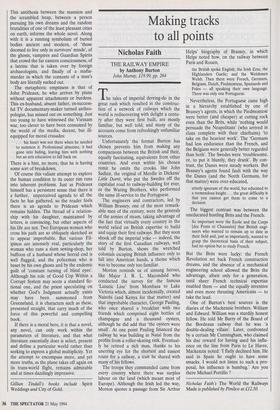Making tracks to all points
Nicholas Faith
THE RAILWAY EMPIRE by Anthony Burton John Murray, £19.99, pp. 264 The tales of imperial derring-do in the great rush which resulted in the construc- tion of a network of railways which the world is rediscovering with delight a centu- ry after they were first built, are mostly familiar, but well told; and many of the accounts come from refreshingly unfamiliar sources.
Unfortunately the format Burton has chosen prevents him from making any comparisons between the British and their, equally fascinating, equivalents from other countries. And even within his chosen remit he omits the crooks, like John Sadleir, the original of Merdle in Dickens' Little Donit, who put the Swedes off the capitalist road to railway-building for ever, or the Waring Brothers, who performed the same ill-service to the Portuguese.
The engineers and contractors, led by William Brassey, one of the most remark- able men of the century, were the generals of the armies of steam, taking advantage of the fact that virtually every country in the world relied on British expertise to build and equip their first railways. But they soon shook off the imperial yoke — indeed, the story of the first Canadian railways, well told by Burton, shows the wretched colonials escaping British influence only to fall into American hands, a theme which was to become only too familiar.
Morton reminds us of unsung heroes, like Major J. R. L. Macondald who conducted the survey for the famous 'Lunatic Line' from Mombasa to Lake Victoria which, almost incidentally, created Nairobi (and Kenya for that matter) and that improbable character, George Pauling, who once shared a breakfast with two friends which comprised eight bottles of champagne and a thousand oysters, although he did add that 'the oysters were small'. At one point Pauling financed the railway he was building in Natal from the profits from a roller-skating rink. Eventual- ly he retired a rich man, thanks to his unerring eye for the shortest and easiest route for a railway, a trait he shared with many of his fellows.
The troops they commanded came from every country where there was surplus labour on the land (which meant most of Europe). Although the Irish led the way, Morton quotes a passage from Sir Arthur the British spoke English; the Irish Erse; the Highlanders Gaelic; and the Welshmen Welsh. Then there were French, Germans, Belgians, Dutch, Piedmontese, Spaniards and Poles — all speaking their own language. There was only one Portuguese.
Nevertheless, the Portuguese came high in a hierarchy established by one of Brassey's agents, in which the Piedmontese were better (and cheaper) at cutting rock even than the Brits, while 'nothing would persuade the Neapolitans' (who arrived in clans complete with their chieftains) 'to take on the heaviest work'. The 'Germans had less endurance than the French, and the Belgians were generally better regarded than both'. The Swedes were 'troublesome, or, to put it bluntly, they drank'. By con- trast, the Danes were steady workers. But Brassey's agents found fault with the way the Danes (and the North Germans, for that matter) were over-educated,
utterly ignorant of the world, but educated to a tremendous height. .. the great difficulty is that you cannot get them to come to a decision.
The biggest contrast was between the uneducated hustling Brits and the French:
So important were the Ecole and the Corps [des Fonts et Chaussees] that British engi- neers who wanted to remain up to date in their field and, just as importantly, wanted to grasp the theoretical basis of their subject, had no option but to study French.
But the Brits were lucky: the French Revolution set back French construction dreams, and the absence of a mechanical engineering school allowed the Brits the advantage, albeit only for a generation, until sheer French technical expertise enabled them — and the equally inventive and even more thrusting Americans — to take the lead.
One of Burton's best sources is the diaries of the Mackenzie brothers, William and Edward. William was a sturdily honest fellow. He told Mr Barry of the Board of the Bordeaux railway that he was 'a double-dealing villain'. Later, confronted by a certain Mr Cunningham, who claimed his due reward for having used his influ- ence on the line from Paris to Le Havre, Mackenzie noted: 'I flatly declined him. He said in Spain he ought to have some smacks. I would not listen to such a pro- posal, his influence is humbug.' Are you there Michael Portillo ?
Nicholas Faith's The World the Railways Made is published by Pimlico at £12.50. Helps' biography of Brassey, in which Paris and Rouen,




































































 Previous page
Previous page